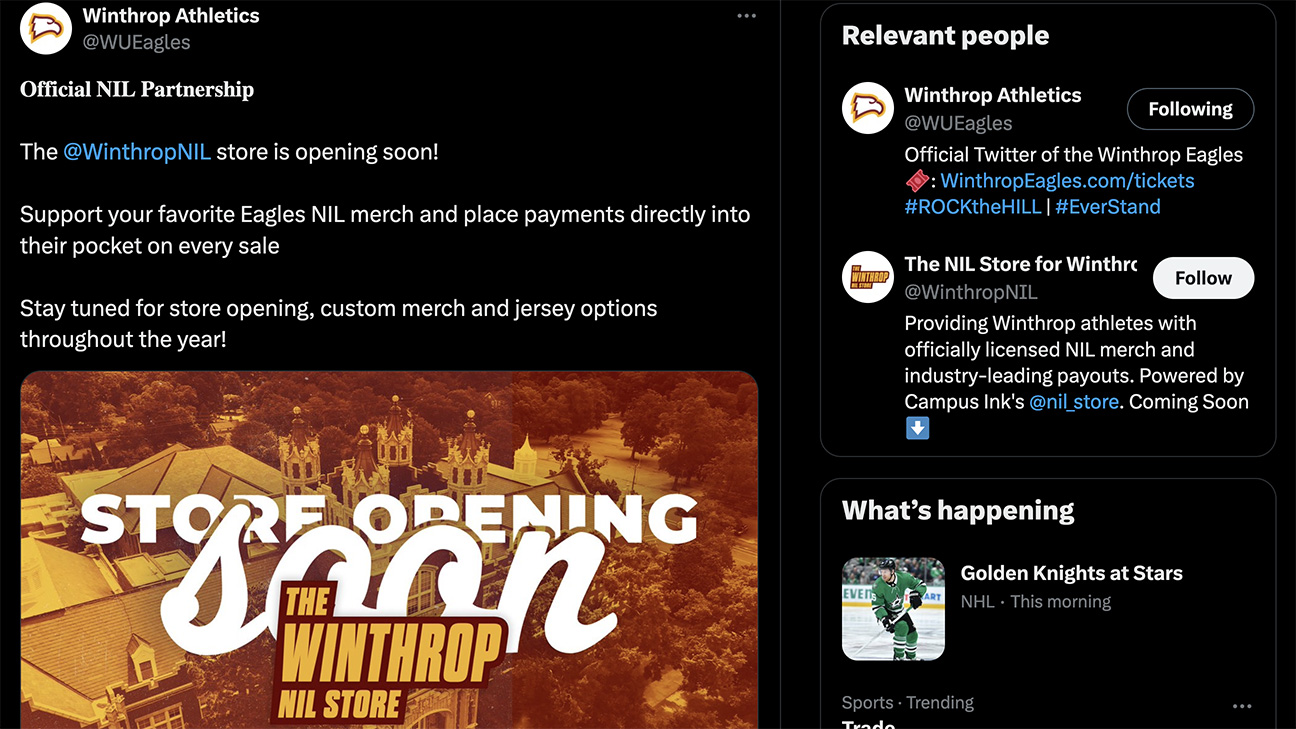Steel Hands Brewery’s “Gameday Lager” features a QR code to donate some proceeds in support of student athletes at USC. (Photo by Mingo Martin/Carolina News and Reporter)
As South Carolina considers legislation that would give universities more flexibility to facilitate name, image and likeness (NIL) deals between companies and student-athletes, university leaders are divided over whether that’s a good thing.
Universities cannot facilitate NIL deals for their players under current South Carolina law. That means athletes must get agents or work through a marketing collective or third party to make money from their image even while they’re in school.
Steve Fink, associate athletics director for USC, said a bill being considered by South Carolina’s Legislature would allow universities such as USC to help its athletes facilitate deals rather than only act as a go between for the athlete and the marketplace.
“We could make major changes with how we operate, or we could (decide to) continue to operate the same,” Fink said. “The main thing the changes would allow is the flexibility to make that decision.”
USC has run into issues in the past with Park Avenue, USC’s in-house NIL agency partnership with Everett Sports Marketing, launched in 2022.
Operations were paused shortly afterward due to NCAA “rule clarifications” that disallowed universities from directly providing NIL services to their student-athletes.
USC athletics instead partnered in July 2023 with the third-party Garnet Trust as the official NIL collective of the university through a contract signed with USC’s branding agent, Learfield.
Collectives work separately from universities to fund NIL deals for student-athletes through donations from fans and boosters. Collectives can sign contracts with players to pay student-athletes for autograph signings, social media posts or event appearances.
Learfield manages the branding of USC through Learfield’s Columbia-based Gamecock Sports Properties.
“It gains that exclusivity,” said Jeremy Smith, director of operations with Garnet Trust. “That allows the university to help and partner with us, because if we are not a partner with Learfield, (USC) can not be vocal of what we’re doing.”
Smith said Garnet Trust is committed to working with all athletes at the university to find them deals.
“I feel like NIL is not just for the best players,” Smith said. “It’s for all athletes. We want to help cultivate a culture of building a brand for each of these athletes that are interested and giving them the opportunity to monetize on that.”
Some believe a change to the state law allowing universities to get directly involved also could present unintended challenges.
Drew Emory, NCAA compliance director at Winthrop University, worries it could put small schools such as Winthrop further behind.
“When the Clemsons and South Carolinas of the world can go out and hire people whose job it is to specifically facilitate deals for their student-athletes, you know, it’s kind of akin to the athletics facilities arms race,” Emory said.
However, something Fink and Emory can agree on is that the bill will help universities facilitate deals with their partner companies.
“With the university already having a working relationship with our partner companies, … basically having that foot in the door could help those athletes now,” Emory said.
Fink believes the best opportunities are with USC’s current partners and athletes working together.
Smith says 80% of Garnet Trust’s funding comes from donors. He contends that wasn’t the original intention of NIL in college sports.
“It was about monetizing all the name, image, and likeness of someone’s brand,” Smith said. “But there’s this lack of rules in this space. Donors got involved, and it changed. We’re living in a world I am not fully aligned with, but we have to do what’s in the best interest of the student-athletes and university to stay competitive in our conference and in college sports.”
After the U.S. Supreme Court ruled in 2021 that the NCAA could not keep student-athletes from making NIL deals, South Carolina modified its state law to allow NIL deals.
This new legislation, which would amend the existing S.C. law, would allow state universities to help facilitate NIL deals.
Bills similar to South Carolina’s H. 4957 have already passed in other states, including Arkansas, Texas, Oklahoma and Colorado.
The bill was introduced to the House of Representatives in January, where it passed unanimously.
The bill resides in the full state Senate after passing the Senate Committee on Education.
The NCAA was forced by a federal judge in February to freeze its rules and investigations involving NIL after a preliminary injunction was granted in a lawsuit between the NCAA and the attorneys general of Tennessee and Virginia.
The antitrust suit challenged the NCAA rules against compensation in exchange for attendance at an institution.
In addition to allowing universities to help oversee offers to student-athletes, South Carolina’s proposed change would allow universities to provide tax guidance, university trademarks in the promotion of deals and oversight over booster-funded collectives.
The S.C. bill also would set a cap on agent compensation at 30%. The cap was added in February while the bill was in the Senate Committee on Education.
“Not all agencies are the same,” Sen. Larry Grooms, R-Berkeley, said during the Education Committee meeting. “Some have (a) much greater track records than others, and some of those demand a higher compensation rank. And if we don’t raise the limit, then we’d be locking out some of the top agents from our student-athletes.”
The Education Committee also added an amendment that would clarify that no funds from the university would be used for NIL.
Smith said there’s a lot that needs to be ironed out for the student-athletes and he hopes the NIL law in the state will change in coming days.



